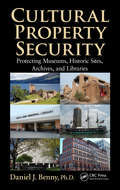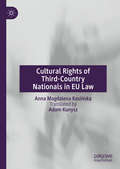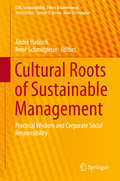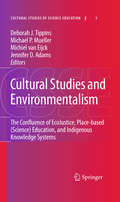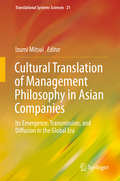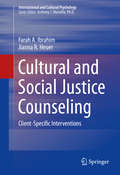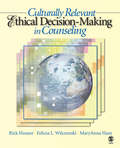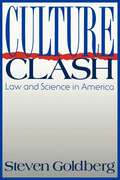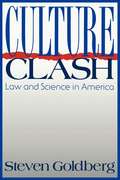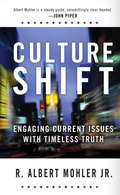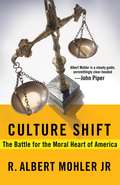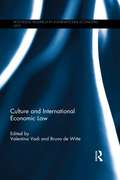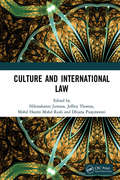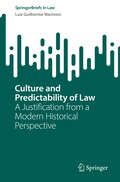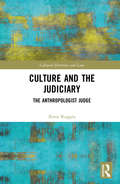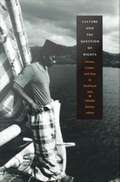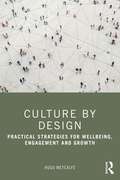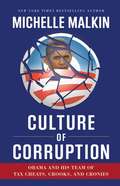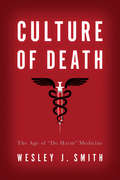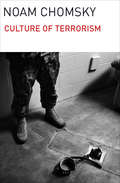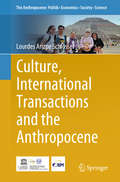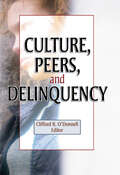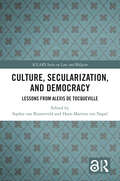- Table View
- List View
Cultural Property Security: Protecting Museums, Historic Sites, Archives, and Libraries
by Daniel J. BennyThe protection and security of cultural properties is of primary concern to the thousands of federal, state, county, city, and private institutions entrusted with housing and displaying our national heritage and history of our society. Cultural property security is of global importance as well, with tens of thousands of institutions internationally
Cultural Rights of Third-Country Nationals in EU Law
by Anna Magdalena KosińskaCultural Rights of Third-Country Nationals in EU Law provides a complex analysis of the cultural rights of third-country nationals in European Union Law. Originally published in Polish and translated into English for the first time, this book examines EU migration policy and law from the perspective of cultural rights protection for migrants as a part of the overall system of human rights protection in the EU. In offering a careful analysis of these standards and their implementation mechanisms, Cultural Rights of Third-Country Nationals in EU Law will be of use to all researchers on EU law, especially in the areas of asylum law, migration law and the protection of the borders. It will also be useful to scholars and practitioners in the area of cultural policy.
Cultural Roots of Sustainable Management: Practical Wisdom and Corporate Social Responsibility (CSR, Sustainability, Ethics & Governance)
by André Habisch René SchmidpeterThisbook provides a multidisciplinary approach to Corporate Social Responsibility. While for decades a purely mathematical-technical orientation dominated thebusiness curriculum, this book presents CSR and sustainability as a businessconcept embedded in its cultural and spiritual context. It initially approachespractical wisdom from different cultural and religious traditions as a source ofspiritual capital for sustainable business practices. Subsequently, it linkscurrent CSR concepts and the latest thinking in CSR with long-standing culturaland spiritual knowledge, promoting a more comprehensive view on sustainabilitymanagement and its implementation at business enterprises. The book collectsand unites viewpoints from various cultural and religious contexts, offering acomprehensive guide for international and globally active companies.
Cultural Studies and Environmentalism: The Confluence of EcoJustice, Place-based (Science) Education, and Indigenous Knowledge Systems (Cultural Studies of Science Education #3)
by Michiel Van Eijck Jennifer D Adams Michael P. Mueller Deborah J. TippinsAs the first book to explore the confluence of three emerging yet critical fields of study, this work sets an exacting standard. The editors' aim was to produce the most authoritative guide for ecojustice, place-based education, and indigenous knowledge in education. Aimed at a wide audience that includes, but is not restricted to, science educators and policymakers, Cultural Studies and Environmentalism starts from the premise that schooling is a small part of the larger educational domain in which we live and learn. Informed by this overarching notion, the book opens up ways in which home-grown talents, narratives, and knowledge can be developed, and eco-region awareness and global relationships can be facilitated. Incorporating a diversity of perspectives that include photography, poetry and visual art, the work provides a nuanced lens for evaluating educational problems and community conditions while protecting and conserving the most threatened and vulnerable narratives. Editors and contributors share the view that the impending loss of these narratives should be discussed much more widely than is currently the case, and that both teachers and children can take on some of the responsibility for their preservation. The relevance of ecojustice to this process is clear. Ecojustice philosophy is a way of learning about how we frame, or perceive, the world around us--and why that matters. Although it is not synonymous with social or environmental justice, the priorities of ecojustice span the globe in the same way. It incorporates a deep recognition of the appropriateness and significance of learning from place-based experiences and indigenous knowledge systems rather than depending on some urgent "ecological crises" to advocate for school and societal change. With a multiplicity of diverse voices coming together to explore its key themes, this book is an important starting point for educators in many arenas. It brings into better focus a vital role for the Earth's ecosystems in the context of ecosociocultural theory and participatory democracy alike. "Encompassing theoretical, empirical, and experiential standpoints concerning place-based knowledge systems, this unique book argues for a transformation of (science) education's intellectual tradition of thinking that emphasizes individual cognition. In its place, the book offers a wisdom tradition of thinking, living, and being that emphasizes community survival in harmony within itself and with Mother Earth." Glen Aikenhead
Cultural Translation of Management Philosophy in Asian Companies: Its Emergence, Transmission, and Diffusion in the Global Era (Translational Systems Sciences #21)
by Izumi MitsuiThis book discusses management philosophy based on case studies in companies in Japan, Korea and China. In an era of increasing globalization and the internet society, it is time for companies to re-examine their mission and existence. Repeated corporate scandals and global environmental issues have revealed the need for CSR (corporate social responsibility) and business ethics. At the same time, cross-cultural conflicts in the workplace highlight the necessity for management to integrate multiple values. In other words, the importance of value in a company has to be reconsidered. This timely book re-evaluates the issue of management philosophy in the context of the global society. It approaches the issue of management philosophy from the perspective of keiei-jinruigaku, the anthropology of business administration, presenting interdisciplinary research consisting of fields such as management studies, anthropology, religious studies and sociology. By focusing on the phenomena of transmission of management philosophy to other areas by cultural translation, the book reveals the dynamic process of the global transmission of management philosophy.
Cultural and Social Justice Counseling: Client-Specific Interventions (International and Cultural Psychology)
by Farah A. Ibrahim Jianna R. HeuerThis timely volume gives readers a robust framework and innovative tools for incorporating clients' unique cultural variables in counseling and therapy. Its chapters identify cultural, societal, and worldview-based contexts for understanding clients, from the relatively familiar (ethnicity, gender, age) to the less explored (migration status, social privilege, geographic environment). Diverse cases illustrate how cultural assessments contribute to building the therapeutic relationship and developing interventions that respect client individuality as well as group identity. In these pages, clinicians are offered effective strategies for conducting more relevant and meaningful therapy, resulting in better outcomes for client populations that have traditionally been marginalized and underserved. The appendices include the Scale to Assess Worldview© (Ibrahim & Kahn, 1984), The Acculturation Index© (Ibrahim, 2008), and the Cultural Identity Check List-Revised© (Ibrahim, 2007). Among the topics covered: Cultural identity: components and assessment. Worldview: implications for culturally responsive and ethical practice. Understanding acculturation and its use in counseling and psychotherapy. Social justice variables critical for conducting counseling and psychotherapy. Immigrants: identity development and counseling issues. Designing interventions using the social justice and cultural responsiveness model. Cultural and Social Justice Counseling is a profound source of knowledge for clinicians and students in mental health fields (counselors, psychologists, psychiatrists, psychiatric nurses, social workers) who are working with clients from diverse cultural backgrounds, including those working in international settings, with clients across cultures, and with sojourners to the US.
Culturally Relevant Ethical Decision-Making in Counseling
by Rick A. Houser Felicia L. Wilczenski Dr MaryAnna HamCulturally Relevant Ethical Decision-Making in Counseling presents a hermeneutic orientation and framework to address contextual issues in ethical decision-making in counseling and psychotherapy. Authors Rick Houser, Felicia L. Wilczenski, and Mary Anna Ham incorporate broad perspectives of ethical theories which are grounded in various worldviews and sensitive to cultural issues.
Culture Clash: Law and Science in America
by Steven GoldbergIt is an article of faith in America that scientific advances will lead to wondrous progress in our daily lives. Americans proudly support scientific research that yields stunning breakthroughs and Nobel prizes. We relish the ensuing debate about the implications—moral, ethical, practical—of these advances. Will genetic engineering change our basic nature? Will artificial intelligence challenge our sense of human uniqueness? And yet the actual implementation of these technologies is often sluggish and much-delayed. From Star Trek to Jurassic Park, the American imagination has always been fascinated by the power of scientific technology. But what does the reality of scientific progress mean for our society? In this controversial book, Steven Goldberg provides a compelling look at the intersection of two of America's most powerful communities—law and science—to explain this apparent contradiction. Rarely considered in tandem, law and science highlight a fundamental paradox in the American character, the struggle between progress and process. Science, with its ethic of endless progress, has long fit beautifully with America's self image. Law, in accordance with the American ideal of giving everyone a fair say, stresses process above all else, seeking an acceptable, rather than a scientifically correct, result. This characteristic has been especially influential in light of the explosive growth of the legal community in recent years. Exposing how the legal system both supports and restricts American science and technology, Goldberg considers the role and future of three projects—artificial intelligence, nuclear fusion, and the human genome initiative—to argue for a scientific vision that infuses research with social goals beyond the pure search for truth. Certain to provoke debate within a wide range of academic and professional communities, Culture Clash reveals one of the most important and defining conflicts in contemporary American life.
Culture Clash: Law and Science in America (Open Access Lib And Hc Ser.)
by Steven GoldbergIt is an article of faith in America that scientific advances will lead to wondrous progress in our daily lives. Americans proudly support scientific research that yields stunning breakthroughs and Nobel prizes. We relish the ensuing debate about the implications—moral, ethical, practical—of these advances. Will genetic engineering change our basic nature? Will artificial intelligence challenge our sense of human uniqueness? And yet the actual implementation of these technologies is often sluggish and much-delayed. From Star Trek to Jurassic Park, the American imagination has always been fascinated by the power of scientific technology. But what does the reality of scientific progress mean for our society? In this controversial book, Steven Goldberg provides a compelling look at the intersection of two of America's most powerful communities—law and science—to explain this apparent contradiction. Rarely considered in tandem, law and science highlight a fundamental paradox in the American character, the struggle between progress and process. Science, with its ethic of endless progress, has long fit beautifully with America's self image. Law, in accordance with the American ideal of giving everyone a fair say, stresses process above all else, seeking an acceptable, rather than a scientifically correct, result. This characteristic has been especially influential in light of the explosive growth of the legal community in recent years. Exposing how the legal system both supports and restricts American science and technology, Goldberg considers the role and future of three projects—artificial intelligence, nuclear fusion, and the human genome initiative—to argue for a scientific vision that infuses research with social goals beyond the pure search for truth. Certain to provoke debate within a wide range of academic and professional communities, Culture Clash reveals one of the most important and defining conflicts in contemporary American life.
Culture Shift
by R. Albert Mohler Jr.Are you prepared to address the most challenging cultural issues of your time? Mass media and technology are exploding. Popular entertainment relentlessly pushes the envelope. Biomedicine stretches ethical boundaries. Political issues shift with the polls. The world in which you live is in the midst of a major cultural transformation–one leading to a widespread lack of faith, an increase in moral relativism, and a rejection of absolute truth. How are we to remain faithful followers of Christ as we live in this ever-shifting culture? How should we think about–and respond to–the crucial moral questions of our day? How can we stand up for the truth? InCulture Shift,Dr. R. Albert Mohler–one of today’s leading Christian thinkers and spokespersons–addresses these tough topics clearly, biblically and passionately: •Christian faith and politics •The Supreme Court and religion •The truth about terrorism •Christian parents and public schools •The abortion debate •Christian response to global tragedies •And many more Here is trustworthy help for developing a comprehensive Christian worldview. It’s timely information powerfully connected to timeless truth that will equip you to stand strong and speak out. From the Hardcover edition.
Culture Shift: The Battle for the Moral Heart of America
by R. Albert MohlerAre you prepared to address the most challenging cultural issues of your time?Mass media and technology are exploding. Popular entertainment relentlessly pushes the envelope. Biomedicine stretches ethical boundaries. Political issues shift with the polls. The world in which you live is in the midst of a major cultural transformation-one leading to a widespread lack of faith, an increase in moral relativism, and a rejection of absolute truth. How are we to remain faithful followers of Christ as we live in this ever-shifting culture? How should we think about-and respond to-the crucial moral questions of our day? How can we stand up for the truth?In Culture Shift, Dr. R. Albert Mohler-one of today's leading Christian thinkers and spokespersons-addresses these tough topics clearly, biblically and passionately:*Christian faith and politics*The Supreme Court and religion*The truth about terrorism*Christian parents and public schools*The abortion debate*Christian response to global tragedies*And many moreHere is trustworthy help for developing a comprehensive Christian worldview. It's timely information powerfully connected to timeless truth that will equip you to stand strong and speak out.From the Hardcover edition.
Culture and International Economic Law (Routledge Research in International Economic Law)
by Valentina Vadi Bruno De WitteGlobalization and international economic governance offer unprecedented opportunities for cultural exchange. Foreign direct investments can promote cultural diversity and provide the funds needed to locate, recover and preserve cultural heritage. Nonetheless, globalization and international economic governance can also jeopardize cultural diversity and determine the erosion of the cultural wealth of nations. Has an international economic culture emerged that emphasizes productivity and economic development at the expense of the common wealth? This book explores the ‘clash of cultures’ between international law and international cultural law, and asks whether States can promote economic development without infringing their cultural wealth. The book contains original chapters by experts in the field. Key issues include how international courts and tribunals are adjudicating culture–related cases; the interplay between indigenous peoples' rights and economic globalization; and the relationships between culture, human rights, and economic activities. The book will be of great interest and use to researchers and students of international trade law, cultural heritage law, and public international law.
Culture and International Law: Proceedings of the International Conference of the Centre for International Law Studies (CILS 2018), October 2-3, 2018, Malang, Indonesia
by Hikmahanto Juwana Dhiana Puspitawati Jeffrey Thomas Mohd Hazmi Mohd RusliIn this era of globalization, International Law plays a significant role in facing rapid development of various legal issues. Cultural preservation has emerged as an important legal issue that should be considered by States. This book consists of academic papers presented and discussed during the 9th International Conference of the Centre of International Law Studies (9th CILS Conference) held in Malang, Indonesia, 2-3 October 2018. The title of the book represents the major theme of the conference: "Culture and International Law." It is argued that along with globalization, cultural preservation is slowly ignored by States. Various papers presented in the book cover five topics: cultural heritage; cultural rights; culture and economic activity; culture and armed conflict; and a general topic. The authors of the papers are outstanding academics from various countries, Lithuania, United States of America, Australia, Thailand and Indonesia.The conference was organized by Universitas Indonesia in collaboration with Brawijaya University. This book aims to give a useful contribution to the existing literature on International Law, specifically focussing on cultural issues from the perspective of cultural heritage and rights, economic as well as armed conflict.
Culture and Predictability of Law: A Justification from a Modern Historical Perspective (SpringerBriefs in Law)
by Luiz Guilherme MarinoniThis book aims to identify the sociological reasons that resulted in the perceived lack of authority of precedents in civil law systems, starting from the premise that common law systems rely on precedents, while civil law systems do not. The reasoning is based on the sociology of law, mainly on Max Weber’s theory, legal theory, and constitutional law. English common law, seen by Weber as a law devoid of formal rationality mainly because it does not allow for generalization and comprehensiveness, became a predictable system through stare decisis. This serves to highlight not only that it is not to be confused with common law but especially to clarify that “binding precedents” are necessary as the law moves away from calculability. The transformation of civil law due to the impact of constitutionalism, the increasingly widespread use of general clauses, and the evolution of the theory of interpretation eliminated the pretensions of logical positivism and, consequently, the predictability upon which it would be achievable. However, if the law contemplated by Weber ceased to exist and the new law came to depend largely on the subjectivity of the judge, this does not mean that society could remain helpless and devoid of guarantees of predictability and equality, as the new profile of civil law could not be compatible with a coherent legal order and a rational distribution of justice. In the end, the book seeks to demonstrate the fundamentality of precedent for the unity and development of law, clarity and generality, promotion of equality, institutional strengthening, limitation of state power, predictability, economic rationality, respect for the law, and increased personal responsibility.
Culture and the Judiciary: The Anthropologist Judge (Cultural Diversity and Law)
by Ilenia RuggiuHow can jurists resolve multicultural conflicts? Which kind of questions should judges ask when culture enters the horizon of the law? Are they then called to become anthropologists? Through the analysis of hundreds of cases produced through decades of multicultural jurisprudence, this book reconstructs the constitutional and anthropological narratives and the legal techniques used by Western judges to face the challenges posed by multiculturalism: from Japanese parent–child suicide to the burqa, from Jewish circumcision to Roma begging, from kissing a son on his genitals to the claim of indigenous people to fish salmon in natural parks, the book brings the reader into a fascinating journey at the crux of the encounter between the relativism of anthropology and the endeavor toward a democratic coexistence pursued by the law. After identifying the recurrent themes or topoi used by judges and lawyers, this book critically analyzes them, evaluates their persuasive power and suggests a "cultural test" that gathers together the crucial questions to be answered when resolving a multicultural dispute. The "cultural test" is a matrix that guides the judge, lawyers and legislatures across the intricate paths of multiculturalism, to assure a relational dialogue between the law and anthropology.
Culture and the Question of Rights: Forests, Coasts, and Seas in Southeast Asia
by Charles ZernerThis collection of ethnographic and interpretive essays fundamentally alters the debate over indigenous land claims in Southeast Asia and beyond. Based on fieldwork conducted in Malaysia and Indonesia during the 1980s and 1990s, these studies explore new terrain at the intersection of environmental justice, nature conservation, cultural performance, and the politics of making and interpreting claims. Calling for radical redefinitions of development and ownership and for new understandings of the translation of culture and rights in politically dangerous contexts--natural resource frontiers--this volume links social injustice and the degradation of Southeast Asian environments. Charles Zerner and his colleagues show how geographical areas once viewed as wild and undeveloped are actually cultural artifacts shaped by complex interactions with human societies. Drawing on richly varied sources of evidence and interpretation--from trance dances, court proceedings, tree planting patterns, marine and forest rituals, erotic poems, and codifications of customary law, Culture and the Question of Rights reveals the ironies, complexities, and histories of contemporary communities' struggles to retain their gardens, forests, fishing territories, and graveyards. The contributors examine how these cultural activities work to both construct and to lay claim to nature. These essays open up new avenues for negotiating indigenous rights against a background of violence, proliferating markets, and global ideas of biodiversity and threatened habitat. Contributors. Jane Atkinson, Don Brenneis, Stephanie Fried, Nancy Peluso, Marina Roseman, Anna Tsing, Charles Zerner
Culture by Design: Practical Strategies for Wellbeing, Engagement and Growth
by Hugo MetcalfeCulture by Design is about shifting focus from solely organisational outcomes and performance, towards organisational culture and wellbeing. It bridges the gap between two key organisational goals: (a) the drive for improving performance, outcomes and staff retention, and (b) strategies to encourage employee wellbeing, motivation and engagement within the workplace. For too long, organisations have focussed on each of these goals individually, with improvements in one area often coming at the expense of the other. This book demonstrates that this does not need to be the case, that what is required is a shift in perspective towards a culture-focussed approach where improved outcomes, performance and engagement are the added bonuses of a happy, connected staff team. You may be familiar with the phrase "Happy bees work harder"; this book demonstrates the fundamental truth in that statement and illustrates that "What is good for the bees is good for the hive".Through practical strategies and real-world examples, this book reveals that the application of evidence-led, self-directed and cost-effective strategies can support any organisation to cultivate the culture they need to encourage the outcomes they want. This book offers a synthesis of theory and practice from organisational and social psychology, neuroscience and systems dynamics, alongside examples of practical tools you can start using today, to offer a roadmap to cultivating a workplace culture that supports the wellbeing and performance of the organisation as a whole.Whether you are an HR director, People Manager, C-Suite Team member or Wellbeing and Culture Lead, this book is relevant to Leaders in organisations of any size. If you are interested in what works when it comes to improving staff wellbeing, how to go about the process of culture change or who makes the tea and why it matters, then this book is for you.
Culture in the Domains of Law (Cambridge Studies in Law and Society)
by René ProvostWhat does it mean for courts and other legal institutions to be culturally sensitive? What are the institutional implications and consequences of such an aspiration? To what extent is legal discourse capable of accommodating multiple cultural narratives without losing its claim to normative specificity? And how are we to understand meetings of law and culture in the context of formal and informal legal processes, when demands are made to accommodate cultural difference? The encounter of law and culture is a polycentric relation, but these questions draw our attention to law and legal institutions as one site of encounter warranting further investigation, to map out the place of culture in the domains of law by relying on the insights of law, anthropology, politics, and philosophy. Culture in the Domains of Law seeks to examine and answer these questions, resulting in a richer outlook on both law and culture. Maps the interaction between law and culture in a perspective that is legal but not reductive towards culture. Embraces legal pluralism, resulting in a meeting of law and culture to provide a richer view of both. Offers a transversal outlook on the legal responses to claims of cultural difference in different contexts, enriching our understanding of the nature of law.
Culture of Corruption: Obama and His Team of Tax Cheats, Crooks, and Cronies
by Michelle MalkinIn her shocking new book, Malkin goes where the mainstream media refuse to tread. She digs deep into the records of President Obama's staff, revealing corrupt dealings, questionable pasts, and abuses of power throughout his administration.
Culture of Death: The Age of Do Harm Medicine
by Wesley J. SmithWhen his teenage son Christopher, brain-damaged in an auto accident, developed a 105-degree fever following weeks of unconsciousness, John Campbell asked the attending physician for help. The doctor refused. Why bother? The boy's life was effectively over. Campbell refused to accept this verdict. He demanded treatment and threatened legal action. The doctor finally relented. With treatment, Christopher's temperature-which had eventually reached 107.6 degrees-subsided almost immediately. Soon afterward the boy regained consciousness and was learning to walk again.This story is one of many Wesley J. Smith recounts in his award-winning classic critique of the modern bioethics movement, Culture of Death. In this newly updated edition, Smith chronicles how the threats to the equality of human life have accelerated in recent years, from the proliferation of euthanasia and the Brittany Maynard assisted suicide firestorm, to the potential for "death panels" posed by Obamacare and the explosive Terri Schiavo controversy.Culture of Death reveals how more and more doctors have withdrawn from the Hippocratic Oath and how "bioethicists" influence policy by posing questions such as whether organs may be harvested from the terminally ill and disabled. This is a passionate yet coolly reasoned book about the current crisis in medical ethics by an author who has made "the new thanatology" his consuming interest.
Culture of Terrorism (0 A La Izquierda Ser. #Vol. 9)
by Noam Chomsky&“Perhaps the most widely read voice on foreign policy on the planet&” breaks down the Iran-Contra Affair and the scourge of clandestine terrorism (The New York Times Book Review on Theory and Practice). This classic text provides a scathing critique of US political culture through a brilliant analysis of the Iran-Contra scandal. Chomsky irrefutably shows how the United States has opposed human rights and democratization to advance its economic interests. &“The Culture of Terrorism follows an earlier study, Turning the Tide, but with the new insights provided by the flawed Congressional inquiry into the Irangate scandal. [Chomsky&’s] thesis is that United States elites are dedicated to the rule of force, and that their commitment to violence and lawlessness has to be masked by an ideological system which attempts to control and limit the domestic damage done when the mask occasionally slips. Clandestine programs are not a secret to their victims, as he points out. It is the domestic population in the USA which needs to be protected from knowledge of them . . . The record, he argues, shows a continual pattern of violence and disregard for democracy.&” ―Manchester Guardian Weekly &“Chomsky&’s documentation neatly supports his logic. Leftist adherents will applaud, while the majority—depicted as perpetrators or dupes of military-based state capitalism—will ignore the book or dismiss it as rhetoric. But Chomsky has a point of view not frequently encountered in the press.&” —Library Journal &“Closely argued, heavily documented . . . will shake liberals and conservatives alike.&” ―Publishers Weekly
Culture under Cross-Examination: International Justice and the Special Court for Sierra Leone
by Tim KelsallThe international community created the Special Court for Sierra Leone to prosecute those who bore the greatest responsibility for crimes committed during the country's devastating civil war. Tim Kelsall examines some of the challenges posed by the fact that the Court operated in a largely unfamiliar culture, in which the way local people thought about rights, agency and truth-telling sometimes differed radically from the way international lawyers think about these things. By applying an anthro-political perspective to the trials, he unveils a variety of ethical, epistemological, jurisprudential and procedural problems, arguing that although touted as a promising hybrid, the Court failed in crucial ways to adapt to the local culture concerned. Culture matters, and international justice requires a more dialogical, multicultural approach.
Culture, International Transactions and the Anthropocene: Culture And Heritage In A Cosmopolitan World (The Anthropocene: Politik—Economics—Society—Science #17)
by Lourdes Arizpe SchlosserThis book analyses how global transactions have been progressively conducted and negotiated in the last 25 years. Achieving a new understanding of sustainability transition in the Anthropocene requires a deeper analysis on culture. The development of new positions of international institutions, national governments, scientific organizations, private fora and civil society movements on culture and nature shows how global transactions must take place in a rapidly transforming world. In her book the author provides a multi-situated ethnography of live debates on culture, global environmental change, development and diversity directly recorded by the author as a participating and decision-making anthropologist from 1988 to 2016. She examines the politicization and internationalization of culture by recognizing, negotiating and diversifying views on cultures and re-thinking culture in the Anthropocene. The merging of science and policy in taking up cultural and natural challenges in the Anthropocene is discussed.
Culture, Peers, and Delinquency
by Joseph R Ferrari Clifford R O'DonnellIncrease your understanding of the etiology, prevention, and treatment of delinquency! This informative book provides you with specific strategies to assess delinquency and to increase the effectiveness of any prevention program. In addition, it presents a community peer model of delinquency with important implications for delinquency prevention programs and for delinquency research. Examining specific cultural groups in the United States, including Caucasians, East Asians, South-East Asians, Polynesians/Micronesians, and Vietnamese, as well as Japanese youths in their homeland, this model shows how families, schools, and neighborhoods affect the formation of peer groups-and how these groups can facilitate or inhibit delinquency. Culture, Peers, and Delinquency explores the interplay of historical, traditional culture with contemporary youth culture. It also examines the relationship between individual outcome and community disorganization and illustrates how peer relationships are conditioned by gender. The book will increase your understanding of the etiology, prevention, and treatment of delinquency with examples that show treatment alternatives and outcomes, focusing on: intercultural differences in major descriptors of the attitudes and activities of youth the demographics, economics, and history, as well as a fascinating and disturbing cultural analysis of the ever-increasing rate of juvenile delinquency in Japan the influence of peers and culture on Vietnamese youth gangs in Honolulu gender-difference studies of mixed-culture incarcerated adolescents-and what these youths have to say about the detention facility where they go to school a careful analysis of homes, schools, and neighborhoods in terms of their dysfunctions and how they increase the likelihood that their youth will spend time with similar peers and without adult supervision
Culture, Secularization, and Democracy: Lessons from Alexis de Tocqueville (ISSN)
by Sophie van Bijsterveld and Hans-Martien ten NapelFollowing the approach developed by Alexis de Tocqueville, this volume views democracy as a cultural phenomenon. It starts from the assumption that if we are to adequately address concerns about the current state and future of modern Western democracies, we need first to tackle the cultural preconditions necessary for the functioning of a democracy.Since Tocqueville’s time, the book takes the most crucial change in the West to be ‘double secularisation’. Here, this concerns, first, the diminished influence of organised Christianity. Even though secularity was partly a product of Christianity, secularisation is highly significant in terms of the cultural underpinnings of Western democracy. Second, it involves a decreased interest in and knowledge of classical philosophy.Chapters on secularity, family life, civic life, and public spirit focus on central elements of the changed cultural foundation of democracy, exploring issues such as identity politics, the public space, and the role of human rights and natural law in a pluralistic and resilient democracy. The volume concludes with a closer look at the implications of current presentism, that is, the view that only the present counts for the legitimacy and effectiveness of democratic systems. Finally, it asks if double secularisation can also offer fresh opportunities for promoting the conditions of a viable democracy.The book will be of interest to academics and researchers working in the areas of law and religion, constitutional law, political science, history, and philosophy.
